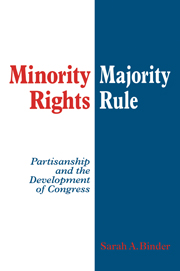Book contents
- Frontmatter
- Contents
- List of tables and figures
- Preface
- 1 The partisan basis of procedural choice
- 2 The evolving concepts of House and Senate minority rights
- 3 Procedural choice in the early Congress: The case of the “previous question”
- 4 Allocating minority rights in the House, 1789–1990
- 5 Institutionalizing party in the nineteenth-century House
- 6 Stacking the partisan deck in the twentieth-century House
- 7 Inherited rules and procedural choice in the Senate
- 8 Assessing the partisan theory
- Appendix 1 Summary of changes in minority rights
- Appendix 2 Measuring congressional workload
- Appendix 3 Measuring party behavior
- Bibliography
- Index
7 - Inherited rules and procedural choice in the Senate
Published online by Cambridge University Press: 10 December 2009
- Frontmatter
- Contents
- List of tables and figures
- Preface
- 1 The partisan basis of procedural choice
- 2 The evolving concepts of House and Senate minority rights
- 3 Procedural choice in the early Congress: The case of the “previous question”
- 4 Allocating minority rights in the House, 1789–1990
- 5 Institutionalizing party in the nineteenth-century House
- 6 Stacking the partisan deck in the twentieth-century House
- 7 Inherited rules and procedural choice in the Senate
- 8 Assessing the partisan theory
- Appendix 1 Summary of changes in minority rights
- Appendix 2 Measuring congressional workload
- Appendix 3 Measuring party behavior
- Bibliography
- Index
Summary
In the older and better times of the Senate, it was
supposed that the representatives of sovereign
States, from a proper sense of what was due to them-
selves, as well as what was due to this body …
would restrain themselves from the excessive use of
irrelevant talking. Modern experience, however, has
shown that this feeling, as a restraint, is utterly in-
sufficient for the purpose of correcting this abuse.
Senator Willie Mangum, 1852There comes a time when tradition has to meet the
realities of the modern age. The minority's rights
must be protected. The majority should not be able
to run roughshod over them, but neither should a
vexatious minority be able to thwart the will of the
majority and not even permit legislation to come up
for a meaningful vote.
Senator Tom Harkin, 1993Diagnosing the ills of the Senate in 1852, Willie Mangum (Whig-North Carolina) warned the Senate that its venerable rules were incapable of meeting the Senate's “modern” needs. Nearly a century and a half later in 1993, Tom Harkin (D-Iowa) reached a similar conclusion: inherited rules were no match for new political conditions in the Senate. Harkin, of course, knew what Mangum and others had learned long before: Senate rules themselves make favored changes in chamber rules nearly impossible. As suggested in Chapters 2 and 3, the deck is stacked against procedural change in the Senate: chamber rules lack a previous question motion and the Senate is a “continuing body” that does not adopt new rules at the start of every Congress.
- Type
- Chapter
- Information
- Minority Rights, Majority RulePartisanship and the Development of Congress, pp. 167 - 201Publisher: Cambridge University PressPrint publication year: 1997



